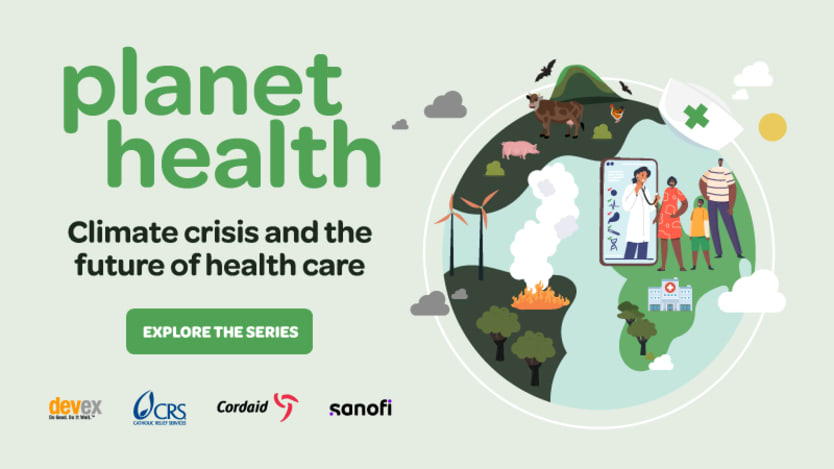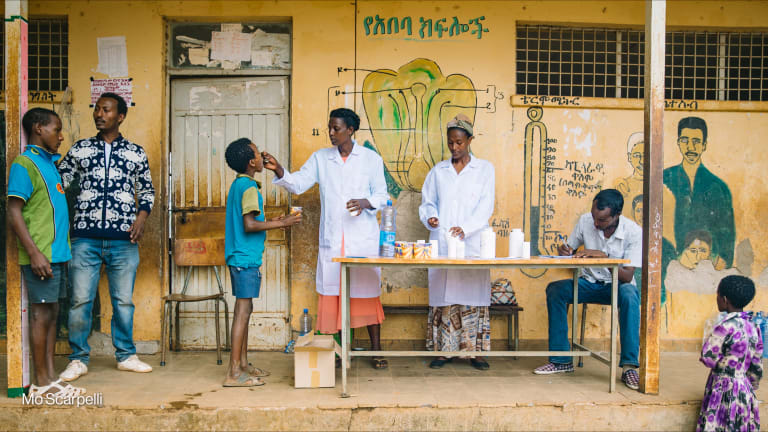Q&A: Why planetary health is a useful lens for development and beyond

As health services around the world brace for more variants of COVID-19 and governments focus on the immediate crises of global food shortages, gas prices, Russia’s war in Ukraine, and protracted conflict in other world regions, more subtle emerging threats are flying under the radar.
Rising carbon emissions and the knock-on effect on human health is something Dr. Sam Myers, a principal scientist at Harvard’s T.H. Chan School of Public Health and founding director of the Planetary Health Alliance, describes as a “quieter, much less visible pandemic” than what we saw with COVID-19.
He refers to worrying stories about vector-borne diseases such as malaria, dengue fever, and yellow fever becoming more prevalent or being found in new areas due to changes in the climate, among many other issues on the horizon.
“When you start to take this lens of thinking about how anthropogenic environmental changes affect health, what you very quickly start to see is that every dimension of health is being extensively impacted by the transformation of our planet's natural systems,” Myers says.
Myers and his team published research in 2014 showing that crops grown in an atmosphere with higher carbon dioxide were deficient in key nutrients, signaling impending issues with nutrition. That research, as well as the 2015 Rockefeller Foundation-Lancet commission on planetary health, spurred the launch of the Planetary Health Alliance, a consortium of universities, research institutes, and NGOs dedicated to understanding climate-related health threats.
Interest in the field of planetary health is growing, Myers says, and is driving new and innovative ways to think about addressing global problems. He told Devex why it’s important, and how global development professionals can harness it in their own work.
This conversation has been edited for length and clarity.
Why is looking at issues through a planetary health lens so useful?
It helps us take the blinders off and recognize that one of the greatest global health challenges we're going to face over the next century is our own transformation of environmental conditions.
A series of problems that we have seen [in the past] as discrete environmental problems — the climate change problem, the biodiversity problem, the pollution problem, desertification, oceans, and so on — are not discrete environmental problems. They are one great big social justice and human survival problem. So, the central insight of the field of planetary health is that this earth crisis is driving a global health and humanitarian crisis. I think that's a very important insight if we're thinking about how we then mobilize the world to address it.
What gets missed if we don’t properly consider the impact of environmental change on health?
I think an awful lot gets missed. We've been very aware of this COVID-19 pandemic, but we've been much less aware of a quieter, much less visible pandemic that involves the erosion of human health as a result of the degradation of our planet's life support systems. … Every dimension of health is being extensively impacted by the transformation of our planet's natural systems.
Take nutrition, for example. We've seen food security reduce, not just in the past few years but even before that — we’ve seen a reversal in improvements in nutrition going back to 2014-2015. This is, in part, because of climate change, the loss of pollinators, arable land degradation, and water scarcity — all the ways we've affected the [crop] growing conditions.
Displacement numbers have been breaking records every year for the past 10 years. There were over 100 million displaced people this past year, and half of those people are children. And a major driver of population displacement is, again, destabilized environmental conditions. We just saw that this year with 33 million displaced people in Pakistan alone from these extreme precipitation events, and we’re seeing it again in Nigeria, where flooding episodes have displaced over a million people.
These events have enormous mental health and physical health impacts. Obviously, in infectious disease, we’re seeing large impacts — but noncommunicable diseases are also being dramatically affected by changes in air quality and changes in food quality.
If you don't bring this lens, you account for all of that morbidity and mortality as, “Oh that’s heart disease, that’s a stroke, or that's malaria,” and yes, it is those things. But what's actually driving those things is our transformation of environmental conditions. We’re getting malaria in the East African highlands, where you never used to get it; you're seeing chikungunya fever moving into Europe, where you never used to see it. It’s through this lens that you start to account for all of that burden of disease in a different way.
You mentioned displacement. Can you tell me a bit about the health impacts of that?
Yes, there’s a very rich literature on migration and displacement and their health effects.
It leads to malnutrition, because people are just cut off from their traditional food supplies. It leads to infectious disease epidemics — so we’re seeing things like measles and other infectious diseases in Pakistan, for example.
You also see big jumps in physical, psychological, and sexual trauma, particularly among women and girls in migrant communities, because there’s just a lot of vulnerability, a lot of people being pushed into very hard living conditions with less security. There are higher rates of anxiety and post-traumatic stress disorder [in displaced communities]. So the mental health effects as well are quite significant.
How can people working in global development apply the concept of planetary health to their own work?
I think the first thing is that people in the public health and medical sectors, as well as in human development, probably need to be open to an expansion of their self definition. These fields can no longer ignore what we've traditionally considered environmental problems as irrelevant to what they're doing. [We see this happen] for example, when the World Health Organization called World Health Day “Our planet, Our health” earlier this year, and with the Geneva charter from WHO that talked about stabilizing natural systems as its first principle.
There is this moment of recognition happening right now that if you're in human development, or global health, you can no longer effectively do your job, you can no longer effectively safeguard human health into the future without stabilizing and regenerating our natural life support systems.
What’s the next frontier for planetary health and what would you like to see in the next 3-5 years?
Interest in the field has exploded in the past six years. At the United Nations General Assembly there was a meeting about integrating planetary health into higher education; the Swedish Medical Society devoted its annual symposium this year to planetary health … and at Sciences Po [in France] I’ve had conversations with people about building out the planetary health policy agenda in Europe. Late September saw the first convening of the European planetary health hub. And two weeks later, the Southeast Asian planetary health hub had its first meeting.
So there is this sense of a very rapid proliferation [of interest]. We’re starting to understand that we need to integrate it into medical education and public health education, and that we need to be advocating at the policy level for a planetary health policy agenda.
I would like to see it continue in this direction. I think this regionalization is very important. With a global community, it can bring moral authority and power into the conversation to say, “Hey, we really do need this transformational change.”
Visit the Planet Health series for more in-depth reporting on the current impact of the climate crisis on human health around the world. Join the conversation by using the hashtag #PlanetHealth.

Search for articles
Most Read
- 1
- 2
- 3
- 4
- 5








